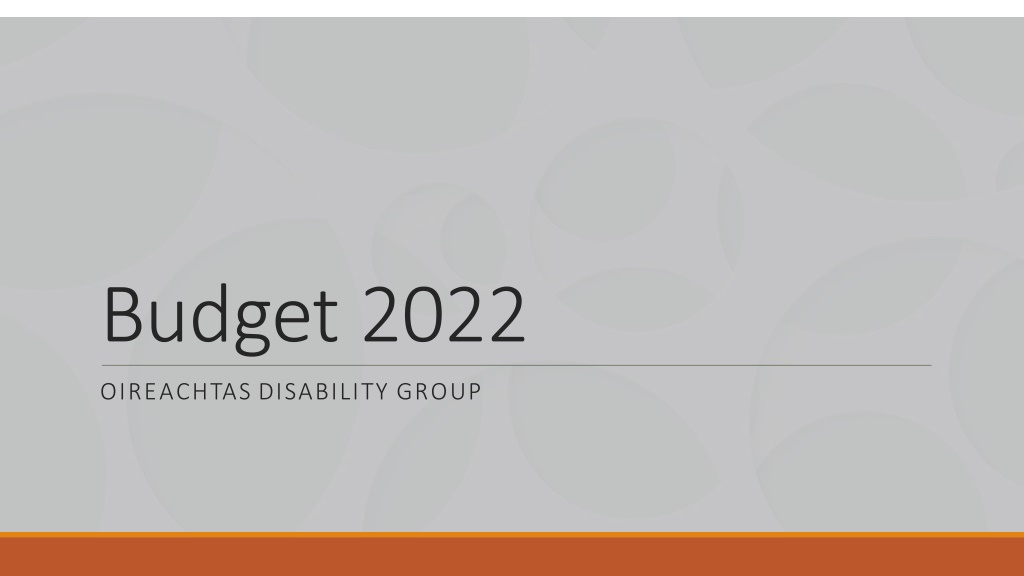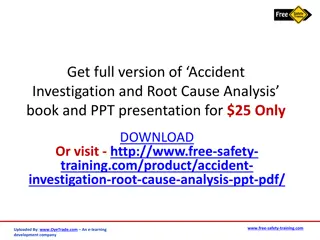
Budget 2022 Oireachtas Disability Group Insights
In Budget 2022, there is a crucial opportunity to address the needs of people with disabilities in Ireland, focusing on poverty, employment, and social inclusion. This article delves into the importance of enhancing funding for disability services, community-based support, and the urgency for increased investment to meet unmet needs. Key priorities and necessary actions for Budget 2022 are discussed to improve the lives of individuals with disabilities and ensure their independence and inclusion.
Download Presentation

Please find below an Image/Link to download the presentation.
The content on the website is provided AS IS for your information and personal use only. It may not be sold, licensed, or shared on other websites without obtaining consent from the author. If you encounter any issues during the download, it is possible that the publisher has removed the file from their server.
You are allowed to download the files provided on this website for personal or commercial use, subject to the condition that they are used lawfully. All files are the property of their respective owners.
The content on the website is provided AS IS for your information and personal use only. It may not be sold, licensed, or shared on other websites without obtaining consent from the author.
E N D
Presentation Transcript
Budget 2022 OIREACHTAS DISABILITY GROUP
Introduction Budget 2022 is an opportunity to show commitment to implementing the UN CRPD Need to build on learnings from COVID-19 Many people with disabilities face poverty and social exclusion On average EU countries spend 2% of their GDP on social protection for disability. Ireland spends 0.8%, the second lowest in the EU Need for investment in community-based services like personal assistance and the areas like housing, transport, social protection and employment that are critical to independence Services are significantly underfunded and carrying deficits of over 40m The Disability Capacity Review estimates that a further 550m to 1000m investment in disability services by 2032 is required to address unmet need and demographic change
Priorities in Budget 2022 Address poverty and employment Coordinated funding of housing & supports Fund services that enable independence Adequate funding for voluntary organisations
Poverty and Employment Ireland has the highest percentage of people with disabilities at risk of poverty in Western Europe (37.8%) (EU SILC). 37.5% (CSO SILC) of people not at work due to illness or disability are at risk of poverty and social exclusion, over 18% live in consistent poverty, and 43% live in deprivation. These rates are 3 times higher than the general population. Disability Allowance was inadequate to begin with and hasn t increased since March 2019. Inflation since then has been 1.5% and is now at its highest level in two years, and expected to increase further. Rent has continued to rise. Ireland s rate of employment for people with disabilities, at 32.3% is almost 20% lower than EU average (EDF 2020). Setting the Pandemic Unemployment Payment at 350 demonstrated the inadequacy of the Disability Allowance rate of 203. Indecon s cost of disability research will add to the substantial evidence on the extra costs people with disabilities/families live with. Based on previous research, the cost has been estimated as 207 a week. The digital divide has had a particular effect on those on Disability Allowance who may not be able to afford broadband, software or hardware to enter education or employment.
Poverty and Employment- Necessary Actions in Budget 2022 Increase Disability Payments by 20 as an interim recognition of extra costs incurred by people with disabilities pending the publication of the Cost of Disability report (cost 231.33m) Invest 10m to establish an assistive technology pathway that follows the person. Raise the 350 threshold on the earnings disregard on Disability Allowance to 400 (cost: 2.5m). Invest in 25 extra job coaches through EmployAbility or similar programmes (cost: 1.25m). Increase the Wage Subsidy Scheme to 65% of the minimum wage (cost: 5.7m). Fund Ability-type programmes to ensure work and training opportunities to young people with disabilities (cost: 2m). Improve funding for accommodations, disability awareness and diversity training for employers (cost: 3m).
Housing 27% of the homeless population have a disability- double the rate of the general population. (Census 2016) 5,057 disabled people are currently on the housing list, many for 5-10 years. The waiting time for people with disabilities has increased in recent years, while it has decreased for others on the housing list. Over 1,300 people with disabilities under the age of 65 are inappropriately placed in nursing homes. The Ombudsman s Wasted Lives report highlighted the plight of many such individuals. 2,914 people with disabilities remain living in congregated settings (HIQA, 2021) Research by the National Federation of Voluntary Service Providers showed at least 1,250 parents aged over 70 and almost 400 over 80 are the primary carers of an adult with a disability with no current pathway to residential supports Huge levels of uncaptured need on top of this e.g. young people living with parents with no prospect of moving out who are not on the housing list A core problem is access to the support packages that enable people to live independently The New Housing Strategy for People with Disabilities will need to address these issues and this will need to be funded housing and supports need to be coordinated and funded across Government Departments
Housing- Necessary Actions in Budget 2022 Fund the establishment of a national mechanism for co-ordination between national HSE, Local Authorities, Housing Agency, Dept of Housing etc. to ensure oversight of local processes, aggregate need and agree budget allocations required across departments (Cost: 400,000). Appoint Disability Housing Coordinators in each Local Authority (cost: 1.8m) Build a minimum of 7.5% of houses in the future to universal design principles, including wheelchair liveable. Provide a minimum of 110m funding for the Capital Assistance Scheme (cost 15m). 280m for decongregation and complete full transition to community living within 5 years. Support 100 people with disabilities under 65 to move out of nursing homes ( 17m) Increase investment in the Housing Adaptation Grants, to: o Return the Adaptation Grant for People with a Disability to the 2010 level of 40m (cost: 8m). Increase the maximum grant amount, which has not been increased for 12 years, from 30,000 to 60,000. Increase the income threshold to qualify to account for cost of disability, and consider only the income of the disabled person. o o
Services that enable independence Article 19 of the UN CRPD confirms the right of people with disabilities to live independently and be included in their communities The Disability Capacity Review to 2032 demonstrates the level of need Only about 9% of people with disabilities, c. 56,000 people, are supported through specialist disability services. Voluntary sector provides almost 70% of disability services A report to the HSE Board reported on by the Irish Times acknowledged that many voluntary disability services are not sustainable Many disability organisations rely significantly on fundraising income to provide essential services HSE Corporate Plan 2021-24 names need for multi-annual investment and reform of disability sector
Services that enable independence - Necessary Actions in Budget 2022 (1/2) The Disability Capacity Review outlines a great need for investment is required in disability services in Budget 2022: 12-22m for respite services 64m for PA* 20m for home support services 10m for community services* 40-70m for day services 220-400m for residential services 280m to fund decongregation 48m for adult and child therapy services 26m to fully roll-out Specialist Clinical Rehabilitation Networks in every Community Health Organisation 160-380m on housing capital for disability services
Services that enable independence - Necessary Actions in Budget 2022 (2/2) Provide funding to support accessible communities, including: Address growing waiting lists for neurology services, including funding integrated pathways Fund a staff member at every Education and Training Board with the role of promoting disabled students participation (cost: 1m). 20m to increase accessibility of local link transport Funding to support the commencement and full implementation of the EPSEN Act 2004 Ensure access to career guidance counsellors in approx. 130 special schools which currently have no access ( 2.8m/ 7.8m full year cost) Establish a Transport Support Scheme to replace the Mobility Allowance. Provide Free Travel Passes to anyone temporarily or permanently unable to drive due to the nature of their disability/health condition (e.g. epilepsy), irrespective of social welfare status. Ensure that voluntary organisations, who provide almost 70% of specialist disability services are adequately supported to meet people s needs: Implement the Catherine Day Report, addressing existing deficits and multi-annual funding requirements (cost: > 40m) Provide pay parity to disability organisations






















